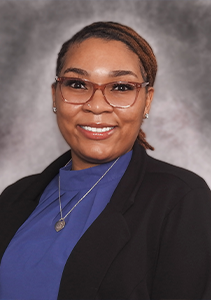If you or a loved one are experiencing suicidal thoughts, please call the National Suicide Prevention Lifeline: (800) 273-TALK (8255). To learn more about suicide, click here.

Mental health disorders affect millions of Americans each year.
At Cook County Health, we believe taking care of your mental health is just as important as your physical care.
Mental health disorders can be serious and affect your emotional, psychological and social health.
Although the bulk of services provided happens in our adult outpatient clinics, we also serve children and adolescents, those struggling with substance use, and we provide consultative services to general physicians.
Mental Health
Adjustment Disorders
As you adjust to significant changes in your life or a stressful event, it’s normal to feel overwhelmed or anxious.
Those stressful feelings tend to go away as you adjust to your new normal. However, if those feelings continue or begin to become excessive, especially if the stressor has ended, it might be the sign of an adjustment disorder.
Symptoms:
-
Acting impulsively
-
Constant feelings of anxiousness, stress or worry
-
Crying
-
Decreased or lack of appetite
-
Difficulty accomplishing day-to-day tasks and activities
-
Feeling hopeless
-
Feeling sad, hopeless or not enjoying things you used to enjoy
-
Feeling withdrawn from social life
-
Suicidal thoughts
-
Trouble concentrating
-
Trouble sleeping
While every stressor is different, adjustment disorders are typically treated short-term with therapy or medication. Make an appointment with your doctor to discuss how to manage your stress.
Anxiety
Anxiety causes feelings of nervousness or uneasiness.
While most people experience anxiety throughout their life, especially during times of high-stress, if those feelings start to become excessive or interfere with daily tasks or relationships, it might be a sign of an anxiety disorder.
Types of anxiety disorders:
-
Generalized anxiety disorder
-
Obsessive-compulsive disorder
-
Panic disorders or attacks
-
Phobias
-
Post-traumatic stress disorder
-
Social anxiety disorder
Symptoms:
-
Difficulty sleeping
-
Dizziness
-
Dry mouth
-
Heart palpitations or irregular heart beat
-
Nausea
-
Panic
-
Restlessness
-
Shortness of breath
-
Uneasiness
Anxiety disorders can be treated through medication and/or therapy. Schedule an appointment with your doctor to discuss your anxiety.
Bipolar Disorder
Bipolar disorder is a serious health condition that can cause extreme behavior changes that affect a person’s mood and energy.
These changes are classified into two states: manic and depressive.
During a manic episode, people are often on a ‘high’ and have a continuous burst of happiness and energy. They may also be extremely irritable or agitated, can act impulsively, be restless and even get little to no sleep.
Following a manic episode, a person experiences the opposite or downfall from the ‘high.’ This is called a depressive episode. Many signs of a depressive episode are the same as depression, including a loss of interest in daily activities, decrease in energy, feelings of intense guilt, anger or sadness and thoughts of suicide. The manic and depressive episodes happen in a cycle.
While both men and women can have bipolar disorder, women are more likely to be diagnosed with bipolar II disorder which means the cycles between manic and depressive episodes happen more often.
Bipolar disorder can be treated with medication or therapies. If you are experiencing episodes of bipolar disorder, contact your doctor immediately to start treatment.
Depression
Depression is more than feeling unhappy.
Intense feelings of sadness and other symptoms, like losing interest in things you enjoy, may be signs of depression. While treatable, depression can be caused by family history, drug use, serious illness or a major life change.
Do I have depression?
Symptoms can vary from person to person. See a doctor immediately if you experience any of these symptoms:
-
Eating too much or too little
-
Feelings of intense guilt, anger or sadness
-
Loss of interest in activities
-
Pain and headaches
-
Sleeping too much or too little
-
Thoughts of suicide
If you have experienced suicidal thoughts, call 911 or the National Suicide Prevention Lifeline at 1-800-273-TALK (8255). Someone is there to help.
Dissociative Disorders
Dissociative disorders can develop when a person has experienced previous trauma.
Dissociative disorders separate memory, identity, thoughts, emotions, actions and even behavior in people, causing feelings of detachment and memory loss, among other major symptoms. This separation can cause harm to everyday functions and activities.
The American Psychiatric Association identifies three dissociative disorders:
-
Dissociative amnesia
-
Dissociative identity disorder
-
Depersonalization/derealization disorder
People with a dissociative disorder may be prone to unsafe behavior. If you or a loved one is experiencing a medical emergency, call 911 or visit an emergency room immediately. If you have a dissociative disorder, please make an appointment with your doctor.
Eating Disorders
Eating disorders are serious illnesses and if left untreated, can be life-threatening.
Eating disorders cause negative eating behaviors that lead to poor nutrition, affecting overall health. They can cause permanent health problems that can harm to your overall health, including your heart, digestive system, bones and oral health. Eating disorders can affect anyone, at any age and must be treated seriously as an illness.
Types of eating disorders:
-
Anorexia nervosa
-
Bulimia nervosa
-
Binge eating disorder
-
Avoidant/Restrictive food intake disorder
Warning signs of eating disorders:
-
Absences during or after eating
-
Extreme dieting
-
Eating food in secret
-
Excessive or unhealthy exercise habits
-
Feelings of low self-esteem
-
Food rituals
-
Gastrointestinal problems
-
Hoarding or hiding food or wrappers
-
Obsessing over appearance
-
Personality changes
-
Restricting certain foods
-
Skipping meals
-
Using dietary supplements or laxatives for weight loss
-
Withdrawal from social life
If you or a loved one is experiencing these signs, make an appointment with your doctor immediately.
Treatment for an eating disorder typically involves therapy, including nutrition counseling. Therapy may take place in a variety of settings.
Personality Disorders
Personality disorders are long-term patterns of unhealthy behaviors that affect thinking, emotions and actions.
People with personality disorders may be rigid or inflexible and believe their way of thinking or feeling is normal. Because of this, personality disorders may affect day-to-day activities and interactions.
There are ten types of personality disorders:
-
Antisocial personality disorder
-
Avoidant personality disorder
-
Borderline personality disorder
-
Dependent personality disorder
-
Histrionic personality disorder
-
Narcissistic personality disorder
-
Obsessive-compulsive personality disorder
-
Paranoid personality disorder
-
Schizoid personality disorder
-
Schizotypal personality disorder
Each personality disorder can affect people differently, and some personality disorders may get worse over time without treatment. Treatment for a personality disorder involves therapy and sometimes medication.
Schizophrenia and Other Psychotic Disorders
Psychotic disorders are serious mental disorders that can alter a person’s reality and thinking.
During an episode, people can experience delusions or hallucinations that interrupt their daily functioning and behavior. People experiencing a psychotic disorder may require medical attention during an episode.
Types of psychotic disorders:
-
Brief psychotic disorder
-
Delusional disorder
-
Paraphrenia
-
Psychotic disorder due to a medical condition
-
Schizoaffective disorder
-
Schizophrenia
-
Schizophreniform disorder
-
Substance-induced psychotic disorder
Treatment for a psychotic disorder depends on the type of disorder and the specific symptoms it causes. Most psychotic disorders are treated with therapy or medication.
Sleep Disorders
Sleep disorders are changes in your sleeping pattern that affect your overall health and daily routine.
Common types of sleeping disorders:
-
Insomnia
-
Narcolepsy
-
Parasomnias, including night terrors, sleepwalking, nightmares, sleep talking, etc.
-
Restless legs syndrome
-
Sleep apnea
Make an appointment with your doctor if you’re experiencing difficulty sleeping to determine a course of treatment.
Somatoform Disorders
Somatoform disorders cause physical symptoms that cannot be defined to a medical condition or illness.
These physical symptoms can cause physical and emotional distress, impacting daily life.
Types of somatoform disorders:
-
Body dysmorphic disorder
-
Conversion disorder
-
Hypochondriasis
-
Pain disorder
-
Somatization disorder
-
Undifferentiated somatoform disorder
If you are experiencing a physical condition, speak with your primary care physician to see if there’s a medical condition causing your symptoms and then refer you to a Cook County Health mental health professional.
Alcoholism
According to the National Institute on Alcohol Abuse and Alcoholism (NIAAA), roughly 15 million American adults have alcohol use disorders.
Alcoholism is more than having a few drinks occasionally with your friends, it’s the inability to control or stop drinking due to a physical and emotional dependence on alcohol. Just like other diseases, alcoholism is a chronic disease that will only get worse over time unless you get treatment. This is a disease of the mind, body, and spirit; however, it is a disease that people can and do recover from.
Warning signs of alcohol dependence
-
Causes health problems
-
Constantly craving alcohol no matter the time of day
-
Drinking interferes with work or school
-
Experiencing withdrawal symptoms, including feeling sick to your stomach, sweating or shaking
-
Family history of addiction
-
Work environments with easy access to alcohol, such as restaurants and bars
-
Work in high-stress environments
-
Your drinking has harmed relationship with others
-
You give up other enjoyable activities to drink
Moderate drinking is defined as having up to four alcoholic drinks for men and three for women in any single day and a maximum of 14 drinks for men and seven drinks for women per week. Anything more is considered heavy drinking.
Long-term health effects
Many studies have shown that heavy drinking can cause a variety of long-term health effects, such as:
-
Bleeding issues
-
Brain and nerve damage
-
Cancer
-
Heart problems
-
Liver cirrhosis
-
Serious memory loss
-
Stomach ailments
-
Impacts on mental health, specifically depression, bipolar disorder and anxiety
Cook County Health offers substance use assessments and treatment for people with alcohol or drug addiction. To connect with a licensed clinical social worker who can evaluate your needs for mental health or substance use treatment, please call Cook County Health Behavioral Health Access Line at (844) 433-8793.
Opioids
The U.S. is facing an opioid epidemic, and Cook County is not immune.
In the last decade, opioid use and abuse has skyrocketed, becoming a public health crisis that shows no signs of slowing down.
Not only is the number of opioid-related medical emergencies multiplying, the cases tend to be more severe than they have been in the past, largely because of the emergence of highly-potent synthetic opioids like fentanyl.
This opioid crisis is complex and crosses every socioeconomic and demographic strata. Such a dire issue requires a coordinated and multi-pronged approach and collaboration between health care providers, elected officials, first responders, pharmaceutical companies and community leaders.
Cook County Health, including the Cook County Department of Public Health (CCDPH), the Cook County Medical Examiner, and the Chicago Department of Public Health have joined in a task force to coordinate their response to this growing epidemic and are releasing annual reports about the local opioid crisis.
For more information on Cook County Health’s key initiatives to combat opioid use, visit our Making an Impact page.
What are opioids?
Opioids are a broad class of drugs that contain opiates. Opiates are naturally occurring compounds such as morphine, but opioids are synthetic or man-made compounds. Some opioids include hydrocodone, oxycodone, and fentanyl. Opioids and opiates cause the brain to release large amounts of dopamine. Dopamine triggers the body’s pleasure receptors in throughout the nervous system, limiting pain messages from getting to the brain. This makes opioids effective painkillers. It also makes opioids a highly addictive class of drugs, as the body doesn’t naturally release such large amounts of dopamine.
There are prescription opioids like hydrocodone, oxycodone and morphine, as well as illicit street opioids, such as heroin. Recently, health and law enforcement officials have seen more overdose cases related to synthetic opioids: fentanyl (a powerful prescription opioid used during surgeries), carfentanil (a large animal tranquilizer), and acrylfentanyl (an illicit “designer” drug). Often these synthetic opioids are added to heroin to make it more powerful. However, this practice is extremely dangerous as users are often unaware of the substance’s potency, greatly increasing their risk of overdose. Carfentanil, for example, is 8,000-10,000 times more potent than morphine and can quickly cause fatal overdoses.
What is the problem with opioids?
Toxic doses of opioids impact the body’s ability to regulate breathing, leading to fatal respiratory arrest and brain damage.
When prescription drugs are used outside their prescribed parameters, they carry heightened risks, especially for addiction. The pathway from legal use of prescription opioids to illegal use of illicit opioids, including heroin, has been well documented.
Prescription opioids are effective in treating patients with pain, when prescribed correctly and taken a directed. Doctors should discuss the risks and side effects of a prescription opioid with their patients.
What are the signs of opioid use and overdose?
Individuals under the influence of opioids may present with small pupils, slurred speech, drowsiness and slowed breathing. Overdose symptoms can present quickly and include: inability to respond to stimuli, loss of consciousness, respiratory and cardiac arrest and death.
What is naloxone?
Naloxone is an opioid antidote that can reverse the effects of both illicit and prescription opioids. Naloxone can save the life of a person who has overdosed and can be safely administered by emergency first responders, family or friends. The strength of synthetic opioids often necessitates much larger doses of naloxone. Individuals who overdose on heroin often require just 0.4 milligrams of naloxone to be revived, but some who have ingested synthetic opioids, such as fentanyl, may require up to 10 milligrams. Naloxone must be administered promptly after an overdose as it does not reverse the effects of prolonged respiratory arrest.
Locations
Adult Psychiatry Consultation Liaison Service
John H. Stroger, Jr. Hospital of Cook County
1969 W. Odgen Ave.
Chicago, IL 60612
(312) 864-6000
Monday - Friday from 8 am to 4 pm
Child & Adult Psychiatry Consultation Liaison Service
John H. Stroger, Jr. Hospital of Cook County
1969 W. Odgen Ave.
Chicago, IL 60612
(312) 864-6000
Monday - Friday from 8 am to 4 pm
Adult Outpatient Psychiatry Services
Provident Hospital of Cook County
500 E. 51st St.
Chicago, IL 60615
(312) 572-2000
Tuesday from 8 am to 4 pm
Morton East Adolescent Health Center Psychiatry Services
Morton East High School
2423 S. Austin Blvd.
Chicago, IL 60804
(708) 656-1130
Monday and Thursday from 8 am to 12 pm
HIV Psychiatry Services
The Ruth M. Rothstein CORE Center
2020 W. Harrison St.
Chicago, IL 60612
(312) 572-4500
Monday - Friday from 9 am to 5 pm


